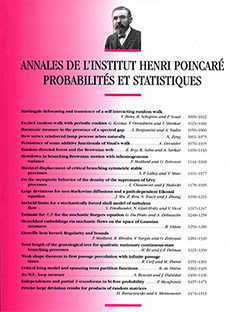Abstract
Given a supercritical branching random walk on ${\mathbb{R}}$ started from the origin, let $M_{n}$ be the maximal position of individuals at the $n$th generation. Under some mild conditions, it is proved in (Ann. Probab. 41 (2013) 1362–1426) that as $n\rightarrow\infty $, $M_{n}-x^{*}n+\frac{3}{2\theta ^{*}}\log n$ converges in law for some suitable constants $x^{*}$ and $\theta ^{*}$. In this work, we investigate its moderate deviation, in other words, the convergence rates of \begin{equation*}\mathbb{P}\biggl(M_{n}\leq x^{*}n-\frac{3}{2\theta ^{*}}\log n-\ell _{n}\biggr),\end{equation*} for any positive sequence $(\ell _{n})$ such that $\ell _{n}=O(n)$ and $\ell _{n}\uparrow \infty $. As a by-product, we obtain lower deviation of $M_{n}$; i.e., the convergence rate of $\mathbb{P}(M_{n}\leq xn)$ for $x<x^{*}$ in Böttcher case where the offspring number is at least two. We also apply our techniques to study the small ball probability of the limit of the so-called derivative martingale. Our results complete those in (Ann. Inst. Henri Poincaré Probab. Stat. 52 (2016) 233–260) and (Electron. Commun. Probab. 23 (2018) 1–12).
Étant donnée une marche aléatoire branchante surcritique sur ${\mathbb{R}}$ issue de l’origine, on note $M_{n}$ la position maximale des individus à la $n$-ème génération. Sous des conditions raisonnables, il a été prouvé dans (Ann. Probab. 41 (2013) 1362–1426) que lorsque $n\rightarrow \infty $, $M_{n}-x^{*}n+\frac{3}{2\theta ^{*}}\log n$ converge en loi pour certaines constantes appropriées $x^{*}$ et $\theta ^{*}$. Dans cet article, nous envisageons la déviation modérée, autrement dit, les taux de convergence de \begin{equation*}\mathbb{P}\biggl(M_{n}\leq x^{*}n-\frac{3}{2\theta ^{*}}\log n-\ell _{n}\biggr),\end{equation*} pour toute positive suite $(\ell _{n})$ telle que $\ell _{n}=O(n)$ et $\ell _{n}\uparrow \infty $. En particulier, nous obtenons la déviation inférieure de $M_{n}$; c’est-à-dire, le taux de convergence de $\mathbb{P}(M_{n}\leq xn)$ avec $x<x^{*}$ dans le cas Böttcher où le nombre d’enfants est au moins deux. Nous appliquons également ces techniques à l’étude de la petite déviation de la limite de la martingale dérivée. Notre résultats complètent ceux dans (Ann. Inst. Henri Poincaré Probab. Stat. 52 (2016) 233–260) et (Electron. Commun. Probab. 23 (2018) 1–12).
Citation
Xinxin Chen. Hui He. "Lower deviation and moderate deviation probabilities for maximum of a branching random walk." Ann. Inst. H. Poincaré Probab. Statist. 56 (4) 2507 - 2539, November 2020. https://doi.org/10.1214/20-AIHP1048
Information





